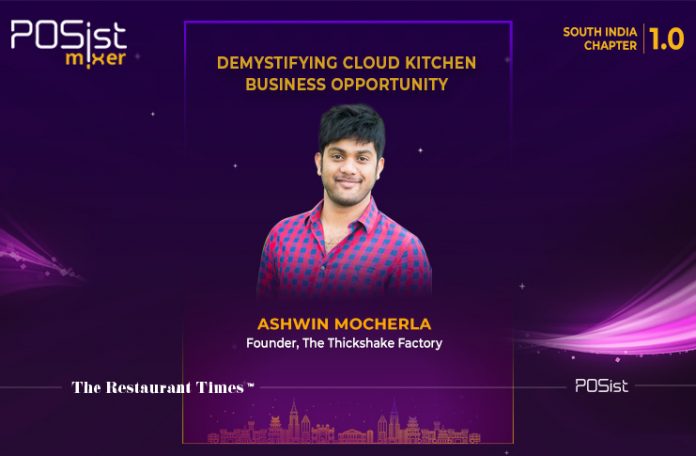In the final session of the event, Mr. Ashwin Mocherla, a young and dynamic entrepreneur, who is the founder of Thick Shake Factory, and also the Asia Recipient of Forbes ‘30 under 30 ’ revealed the lesser-known facts and secrets that lead to the growth of the cloud kitchen business in India. Along with his brother, Mr. Mocherla started the company in December 2013 in Hyderabad with a single store, bootstrapped with a personal loan. As of 2020, Thick Shake Factory is operating with over 130 stores across India and the USA.
In his presentation, Mr. Mocherla discussed key advantages and disadvantages of the cloud kitchen businesses and highlighted the key areas such as customer needs, operational metrics, product quality, hygiene standards, etc. that cloud kitchens must focus on.
Keynotes of Posist Mixer South India Chapter 1.0
Advantages Of A Cloud Kitchen
- Low Capex: In traditional restaurants, CAPEX is higher because of expensive interiors, high rentals, ambiance lighting, etc. Cloud kitchens require relatively low CAPEX and the only major investment is establishing a highly hygienic and functional kitchen.
- Low Operating Cost: Unlike traditional restaurants, cloud kitchens do require a large space spread over 1500-2000 sq ft. A 300-500 sq ft space is sufficient for opening a cloud kitchen. The rentals are also relatively low. Cloud kitchens do not have to worry about the proximity of location. Operators can choose any place, any location provided it is easy to access the kitchen areas. Moreover, there is no need to hire expensive consultants or Front Of House (FOH) staff.
- Easy to manage a cloud kitchen: As most orders are received from aggregator platforms, tracking inventory consumption, marketing spend, which items are doing well, etc directly from the dashboard becomes much easier. However, it is a prerequisite to invest in a robust Enterprise Resource Planning (ERP) software that takes care of all the restaurant needs.
- Easy to market on Third-party apps: With the increasing popularity of third-party food delivery apps and ease of ordering, the only marketing efforts that a cloud kitchen has to put in is in related to presenting an appealing menu, providing attractive offers, and maximizing order turnaround times.
“Setting up a traditional restaurant cost 20-25 lakhs and upward, but the same cloud kitchen requires less than 10 lakh typically”- Mr. Ashwin Mocherla, Founder, Thick Shake Factory
Disadvantages Of Cloud Kitchens
- Difficult to reach out to customers as there is no prior customer information available
- Higher aggregator margins have a direct impact on P&L. Managing a P&L of a cloud kitchen is very difficult when compared to a traditional restaurant because every order comes with a high aggregator margin that is an added cost compared to traditional stores. These include a lot of variable costs that are not easily understood by people in detail.
- The cost of generating orders is high.
According to Mr. Mocherla, Thick Shake Factory has been established in such a way that they have end-to-end control over the supply chains which, in turn, helps in managing the P&L statements better and to leverage inventory systematically.
While discussing the relevance of discounts and having one’s own logistics, Mr. Mocherla emphasizes that the relationship between brand and customers is based on quality. It is important for operators to focus on each and every aspect before giving a discount. Similarly before setting up an in-house logistics team, he says that it is important to have proper funds in place.
“It is about gaining better control over logistics. Owning logistics costs more but provides better control. Having your own logistics also helps in giving that extra value and service to the customers”.
Talking about running multiple brands from one kitchen, Mr. Mocherla reveals that unless operators are prepared with what it takes to establish a different brand, it shouldn’t be a problem in a cloud kitchen model. “If one wants to diversify the product portfolio, without having to change the current processes, prepare beforehand for all the requirements, and be clear about the product and brand portfolio”, he recommends.
On being asked about the importance of investing in restaurant tech solutions, Mr. Mocherla said that he believes restaurant owners must have a clear understanding of the problems they are facing and invest in tech solutions accordingly.
“Tech is becoming a must-have solution for restaurants in the COVID era. To maximize efficiency and revenue, it is definitely recommended to invest in a robust POS solution. Choosing the right tech partner is a must for cloud kitchens or any restaurant format.”
Hope you found ‘Posist Mixer South India Chapter 1.0’ event as enlightening and insightful as we did! Let us know your thoughts in the comment section below!



















